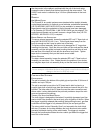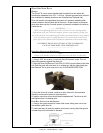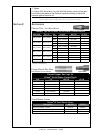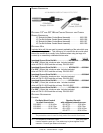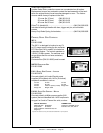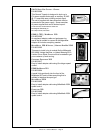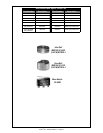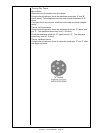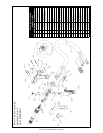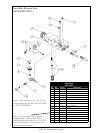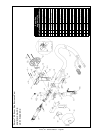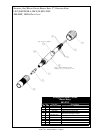
Prince XL
®
- Owner's Manual - Page 14
SECTION E TROUBLESHOOTING
Regardless of which torch or feeder used, all MK Products push-pull guns
operate on the same principle. The 115 VAC or 42VAC slave motor in the
feeder runs at a fast, constant speed, but has very low torque. It is always
trying to feed more wire than the torch motor wants, and when the motor gets
all it wants, it slows the slave motor, preventing a bird’s nest. Because of the
low torque produced by the slave motor, a brake system is used to prevent
wire overrun rather than tension.
The 24 VDC torch motor is controlled by a solid state speed control and a
pot located in the torch. The torch motor, potentiometer, and micro switch
are connected to the cabinet/control box via a control cable and amphenol. If
this cable becomes damaged, a variety of symptoms can occur, depending
on which wire(s) break. To test, check each wire for continuity and shorts.
With the increased torque rating in the current Prince XL motor, P/N 211-
0071, it now draws about twice as much current on start-up as the original
Prince motors P/N’s 211-0054 & 211-0056. Even though the duration of
start-up is very short, about 15msec, it is too much for the standard 2A fuse
to handle. For this reason, all 2A fuses in the motor circuitry (F1) should be
changed to a 3AG 4A fast blow 250V fuse, P/N 151-0043. This new 4A fuse
is suffi cient for use on all model welding guns on the wire feeders, while still
providing protection for the circuitry from any shorts in the motor or motor
leads.
This fuse change includes all Cobramatic, Cobramatic II and CobraMig 250/
260, WC-1, Torpedo’s, and any other motor circuits powering Prince XL or
Spool Guns using motor P/N 211-0071.
Remember the micro switch in the torch activates both the 115 VAC or 42
VAC and 24 VDC circuits in the cabinet. Therefore, if the slave motor and
brake solonoid operate, but the torch does not, look more toward the 24 VDC
circuits, speed control, control cable, or the torch motor. If nothing operates,
look more toward the 115 VAC or 42 VAC input, micro switch leads, or micro
switch.
The complete pot assembly is connected to the motor and set into the
handles. If the pot is disassembled, the pot knob can be put on the shaft in
any position and secured with the set screw. Turn the knob fully CCW, then
fully CW, then fully CCW again. This will self-align the pot, i.e., fully CCW will
be minimum wire feed speed, and fully CW will be maximum wire speed.



